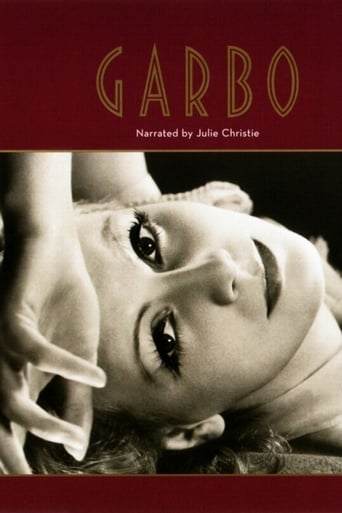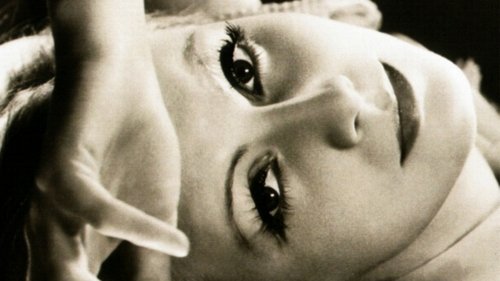TheOneManBoxOffice
Garbo is a documentary that tells the story of the life and career of one of the former biggest stars of Hollywood, Swedish-born actress Greta Garbo, which first premiered in 2005 on Turner Classic Movies, and later released on DVD as part of the TCM Archives Collection. The film features interviews from close family members who knew her all too well, as well as biographers, historians, and film directors that have worked with her via archive footage, including the grandson of MGM founder Louis B. Mayer.Narrated by famed actress Julie Christie, Garbo is a rather informative film documenting the Swedish actress' first steps into stardom when she first worked in advertising, which would lead her to starring in many silent motion pictures released by Metro Goldwyn Mayer, with films like The Mysterious Lady (1928), Love (1927) and Flesh and the Devil (1926), all released in the late 1920s. It was here that all of her films were smash hits and that she was the go-to actress for a guaranteed hit when it came to drama and romantic love stories told on the silver screen. In fact, her success as a motion picture actress got to where she couldn't go anywhere without paparazzi and the press getting in her way (now you know where shows like TMZ and Extra get their image). But it was when the industry decided to transition to sound pictures that things began to take a rocky turn, eventually leading to an early retirement. While her career in Hollywood was short-lived, ending with the 1941 flop Two-Faced Woman, she did leave a large enough impact on the industry all together, and her career as a whole, is illustrated by all of the films she made.Along with many interviews from relatives, filmmakers, and biographers, we are given a glimpse of her magnificent and flawless talent as an actress through clips of various films, a majority of them from the silent era of MGM. In each one of her films, she dedicates herself to the role she plays on screen, as if this was how she acted outside of the studio dealing with the drama that is real life. Garbo wasn't another no-name screen floozy that came out of the woodwork, and her legacy proved that. The film is a study on one of the greatest actresses who ever lived, and an insight on what life was like when Hollywood was rising to become the entertainment capital of the world, and is definitely a must watch for anyone who loves classic movies, myself included.
Marcin Kukuczka
"One of the most celebrated people in the world desperate not to be recognized..." The very beginning of the latest documentary about Garbo that was released on TCM just before her 100th birthday calls viewers' attention to the personality of this great actress. To understand her more profoundly, the director of the documentary, Kevin Brownlow, aims at detailed exploration of Garbo's life, her wonderful but short screen career as well as her later lonely life. Furthermore, the whole movie is supplied with wonderful music by Carl Davies. I have asked my American friends to copy this film from TCM for me and I do not regret. Having seen Steve Cole's GRETA GARBO-A LONE STAR and some of the other minor documentaries, I must admit that GARBO is the best made biographical film about the Swedish beauty so far.The whole documentary is not sensational but rather aims at presenting Garbo as someone full of contradictions and melancholies. Among a lot of interviews with the people in the film, I particularly liked the one with Mimi Pollak, Garbo's friend from youth, Gray Reisfield, Garbo's niece, Derek and Scott Reisfield, Garbo's great-nephews, and Sam Green, Garbo's companion during later years of her life. They wonderfully managed to get the gist of who Garbo really was - a Swede with Swedish upbringing brought at the age of 20 to a totally different world - Hollywood. She was gentle, humorous, and very independent. Daniel Selznick, the grandson of Louis B. Mayer mentions the fact that Garbo could never adapt to the life and manners promoted within MGM family. Joseph Newman recalls the day on which Garbo first arrived in Hollywood and mentions the difficulties she had to cope with. As a result, we do not get a "glorified picture" of how well everything went but a very realistic look at Garbo's experience abroad. Near the end of the documentary, the viewers are showed the most private thing from Garbo's life, her huge New York apartment with a number of antiques and lovely works of art that she gathered while traveling with friends.The documentary is also supplied with a wide range of original archives. While watching the film, I could not believe my eyes what a wonderful use TCM producers made of these materials and how perfectly they fit to the documentary. From a number of Garbo's pictures taken in Sweden before 1925, you will see plenty of footages with Irving Thalberg, Mauritz Stiller, George Cukor as well as clips from all of the movies Garbo made in America and earlier in Europe. A lot of people mention the cinematographer, William H. Daniels, who made a perfect use of lighting and beautifully photographed Garbo. But the interest reaches its peak when Clarence Brown appears on screen in the 1969 interview footage and comments on the movies and Garbo's intuitive abilities of acting. He was Garbo's favorite director and cast her in 7 of his films. While he comments, we see footages from his films, particularly FLESH AND THE DEVIL (1926) and A WOMAN OF AFFAIRS (1928) where Garbo played by the side of the greatest love of her life, John Gilbert. Therefore, the archives that you will see in GARBO are hard or even impossible to find elsewhere. I was totally amazed.Except for aforementioned factors, the documentary is worth seeing thanks to a lot of interesting facts postulated by various people interviewed. Barry Paris, Garbo's biographer, creates a link between Garbo and the audiences of that time; Daniel Selznick concentrates on Garbo - MGM relations; Leatrice Fountain, John Gilbert's daughter, says a lot about Garbo-Gilbert love; actor James Karen refers to the wide and ambiguous presentation of human psyche that Garbo created in her films, which was not that popular among all people. Yet, Mark Vieira, a photographer, recalls Garbo's friend Salka Viertel and her impact on Garbo's films, particularly German version of ANNA Christie and Mamoulian's QUEEN Christina.If that is not enough, the end of the documentary will absolutely surprise you... It shows the last professional footage of Garbo that was taken in 1949, 8 years after she retired from screen. Although she looks gorgeous in it, the studio did not want her any longer. The footage became known as late as after her 1990 death. What governed the decision to let down the greatest cinema star remains undiscovered...The TCM production, GARBO, is a magnificent biography that makes a tribute to Greta Garbo, probably one of the very few actresses that a lot of viewers of the 21st century still admire and appreciate... an actress that was born to play. It is, if not a must see, a highly recommended documentary for all open minded people. 10/10!
WOverly04
To fully comprehend the mystique, one must witness the early silent films.The moment she enters the picture as a woman in her early twenties, the viewer is deluged with a face so overwhelmingly beautiful there is no way to detach one's vision from the screen.Her acting is the same way. Each gesture and facial expression is flawless, as if a precursor to the "method."Surely, observing from whatever star on which she presently resides, she must be amused by the irony. One hundred years after her birth, sixty plus years after her last film and well over a decade beyond her passing, we are still transfixed by her image and captivated by her mystery. Clearly, she was born to the manner.CAMILLE was her signature film, the evidence that she was a star of unequaled magnificence. And she was surrounded by a great cast.One of the most interesting and mystical facets of Garbo are the rumors that she dismissed her co-star in that movie, Robert Taylor, as being unimportant. In fact, there is considerable evidence to indicate she liked him very much. I cite an article written by Eric L. Ergenbright in a 1937 edition of MOVIE MIRROR magazine: describing Garbo's delight at having recently returned from Sweden where she was treated by a doctor for an ongoing illness, and was now cured. She was apparently outgoing and friendly to everyone on the movie set. Among them was her co-star, Robert Taylor. According to Ergenbright, "Robert Taylor...played an important role in the transformation of Greta Garbo...between scenes of CAMILLE witness Bob Taylor, the ex-farm lad from Nebraska, and Greta Garbo, the ex-milliner from Sweden chatting and laughing like cronies of many years standing. Garbo, it seems, was particularly interested in the Great Middle West because to her way of thinking it is the real America. She asked Bob question after question about his childhood, about life in a small town, about the farms in the Middle West." Another story reports that Garbo was extremely moved when Taylor bought her mother flowers for the premiere of CAMILLE at Stockholm, which the three of them attended. When she was making a movie, she tended to live her roles. It was a device she used to make her part "live." But she was not insensitive nor haughty. And she always recognized the importance of her co-stars and the stagehands.
jotix100
TCM has to be congratulated by the magnificent documentary about Greta Garbo it presented recently. As directed by Kevin Brownlow, the film concentrates in presenting a balanced portrait of one of the strongest personalities that graced the screen during the XX Century: Greta Garbo. The narration by Julie Christie, is excellent."Garbo" presents a vivid picture of the mythical figure of Greta Garbo, from her humble origins, to the height of her fame, to the years of oblivion. One thing that comes clear in the film is that contrary to what one might think, Ms. Garbo was not a recluse, on the contrary, she filled her days roaming the streets of her adopted city, New York.The director is to be commended in that he takes us everywhere, covering the life of the actress. He even takes us where no one else has dared to go, Greta Garbo's inner sanctum, the apartment where she lived on the upper east side of Manhattan. We get glimpses of how the great Garbo lived in her elegant place overlooking the East River, where we see some of the paintings she collected.For a woman with humble origins, Ms. Garbo deserves a lot of credit for making herself the exquisite figure she became. One has to put oneself in her shoes to realize that she just wanted to live like anyone else did, shunning the limelight and being the down to earth woman she was.Some of the people interview in the film, like her several family members, the great Clarence Brown, who directed her in some of her best films, George Cukor, and Charles Busch expand on what really comes across that she was an honest human being who had her feet on the ground and had no pretensions or vanity. Her glamorous past was history and all she wanted was to stay away from all the glitter.Congratulations to Kevin Brownlow for his perceptive take on the woman and the myth.



